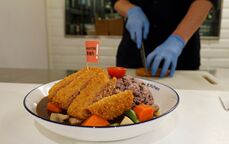必争之地!中国成全球植物肉企业“战场”
在过去,植物肉的消费者以素食者为主,但在今天,越来越多人开始接受并喜爱这种美味又健康的肉类替代产品。国外多家植物肉企业纷纷把目光瞄准了中国市场,试图抢占先机。
China has become a battleground for plant-based meat companies looking to tap into the world’s largest market for meat-consumption.
中国已成为植物肉企业的战场,这些企业希望进入世界上最大的肉类消费市场。

American plant-based meat company Impossible Foods Inc. said Thursday it is awaiting regulatory approval to enter the China market, while rivals such as Beyond Meat have pushed forward with plans to set up production in China.
美国植物肉企业“不可能食品”公司9月10日说,它正等待监管部门批准其进入中国市场,而“超越肉类”公司等竞争对手已在推进在华建立生产基地的计划。
Those are just two of the companies with sights set on the 1.4 billion Chinese consumers they hope may join their Western counterparts in seeking alternatives to meat beyond traditional mock meat offerings that already span the spectrum from faux crab to duck breast and steak.
这两家公司瞄准了14亿中国消费者,它们希望能与西方同行一道寻找传统仿肉之外的肉类替代品,传统仿肉产品已经覆盖从人造蟹肉、鸭胸肉到牛排的诸多品种。
Impossible Foods needs extra regulatory approvals because its plant-based meat products include genetically modified substances including heme, a molecule that imparts a meaty flavor, as well as soy protein
“不可能食品”公司需要获得监管部门的特殊许可,因为其生产的植物肉产品包含血红素(一种能释放肉味的分子)和大豆蛋白等转基因物质。
"We’re going through a regulatory process and it takes its time. It’s going well as far as I can tell,” said Impossible Foods CEO Pat Brown told reporters.
“不可能食品”公司首席执行官帕特·布朗告诉记者说:“我们正在走监管程序,这需要时间。我现在能说的是,进展顺利。”
Beyond Meat, which announced last week it is opening a factory in an industrial zone near Shanghai, says it does not use any genetically modified ingredients.
报道称,“超越肉类”公司上周宣布将在上海附近的一个工业园区开办工厂,它表示不使用任何转基因原料。
Nestle has said it is expanding a plant-based products factory in the northeastern city of Tianjin.
雀巢公司说,它将增加对天津工厂的投资,以建立一条植物肉生产线。
Local Chinese companies such as Zhenmeat and Starfield also are expanding their businesses, partnering with restaurants across the country and even offering vegan-based seafood.
珍肉和星期零等中国本土企业也在扩大业务规模,与全国各地的餐馆合作,甚至提供素食海鲜。
Impossible Foods announced last Thursday the launch of a sausage product in Hong Kong, via menu items in coffee chain Starbucks and some other restaurants.
“不可能食品”公司9月10日宣布,以星巴克咖啡连锁店和其他一些餐馆的菜单商品的形式,在香港推出一款香肠产品。
Impossible Foods' products include plant-based beef, pork and sausage.
“不可能食品”公司的产品包括植物牛肉、猪肉和香肠。
Brown said the company plans to build a factory in China and a domestic supply chain for the ingredients it needs so that its products will be manufactured entirely in China.
布朗说,该公司计划在中国建厂,并在中国国内建立所需原料的供应链,这样就能完全在中国生产其产品。
However, since most plant-based meat products often cost more, breaking into the Chinese market could be challenging.
然而,由于大多数植物肉产品的价格往往较高,打入中国市场可能是一项挑战。
"The China market is challenging because the food culture and consumer palette are immensely diverse, and the market is very price sensitive,” said Elaine Siu, managing director of The Good Food Institute Asia-Pacific. "However, it’s important not to lose sight of what are the fundamentals that make any food product a market hit -- universally it’s taste, price, and convenience.”
美食协会亚太区董事总经理萧凯怡说:“中国市场具有挑战性,因为中国的饮食文化和消费者群体非常多样,而且市场对价格非常敏感。不过,重要的是不要忽视食品受市场欢迎的基本因素——就是公认的口味、价格和便利性。”
Meat consumption in China has risen steadily since 1990, more than doubling though the pace of increase has slowed in the past decade. As a nation, China consumes more meat than any other country.
自1990年以来,中国的肉类消费量一直在稳步增长,尽管增长速度在过去10年间有所放缓,但消费量已翻了一番有余。中国全国的肉类消费量超过其他任何国家。